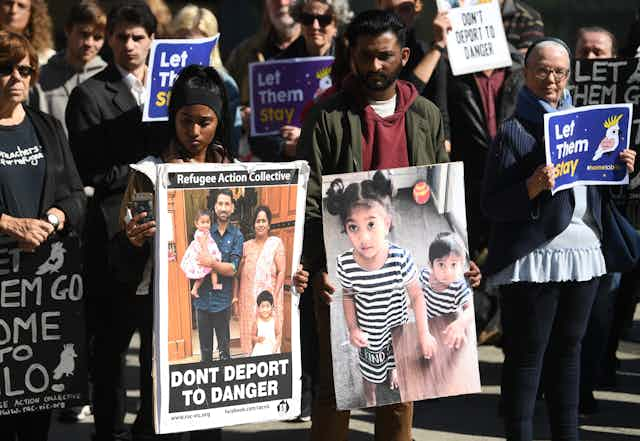Immigration Minister Alex Hawke has announced the Murugappans will be moved from detention on Christmas Island, to community detention in Perth.
This follows mounting public concern for the Tamil family, particularly regarding the health of four-year-old Tharunicaa, who was medevaced to Perth from Christmas Island last week.
Read more: Biloela family moved to Perth in holding decision by Immigration Minister Hawke
But the government is yet to make a final decision about where the family can live in the long-term. The family has previously had its refugee claims rejected.
Priya and Nades Murugappan have been trying to stay in Australia for the best part of a decade, through multiple appeals. All the while, Sri Lanka has one of the worst records of state-perpetrated violence against civilians in the early 21st century.
Tamils and the Sri Lankan civil war
Tamils are an ethnic group native to Sri Lanka. Many Tamils have sought to come to Australia due to fear of persecution in their home country. This is due to links either real or perceived with the Liberation Tigers of Tamil Eelam (Tamil Tigers), a separatist group fighting for an independent homeland for Tamils in north and east Sri Lanka.

The Tamil Tigers fought and lost a brutal 26-year civil war with the Sinhalese majority government, which ended in 2009. This included serious allegations of genocide and the military’s intentional shelling of government-designated “no fire zones”. It is estimated at least 100,000 Tamils died in the final stages of the war.
In 2012, the United Nations admitted its “failures” in protecting the Tamils. Namely, its failure to “act within the scope of institutional mandates to meet protection responsibilities”.
Post-war persecution
The post-war period has also been marked by the ongoing persecution of the Tamils.
In 2018, the Human Rights Watch reported that military occupation of the north and east of the island “is a cruel legacy” of the war and encroaches on Tamil civilian life. In 2019, the International Truth and Justice Project reported Sri Lankan police had committed torture against civilians, with many of the perpetrators who orchestrated such crimes occupying senior positions in government.
Read more: As a young child is evacuated from detention, could this see the Biloela Tamil family go free?
Earlier this year, the United Nations Human Rights Office published a damning report on the deteriorating human rights situation in Sri Lanka, observing:
deepening impunity, increasing militarization of governmental functions, ethno-nationalist rhetoric, and intimidation of civil society.
Tamils in Australia
According to the 2016 census, there more than 27,000 Tamil people — who were born in Sri Lanka — living in Australia. But it could be many more.
Tamils seeking asylum in Australia reportedly face some of the lowest acceptance rates. And Australia’s position when it comes to Sri Lanka — and the safety of Tamils — has drawn criticism from human rights experts at home and overseas.
The Department of Home Affairs relies heavily on the Department of Foreign Affairs and Trade country information report on Sri Lanka to decide whether to give permanent protection to Tamil asylum seekers. The current (2019) report says:
Sri Lankans face a low risk of torture on a day-to-day basis. In the case of individuals detained by the authorities, DFAT assesses the risk of torture to be moderate. Where it occurs, some mistreatment may amount to torture. DFAT assesses that Sri Lankans face a low risk of torture overall.
This is also despite reports from Tamils deported from Australia they have been targeted by local security forces on their return to Sri Lanka.
In May this year, the United Kingdom’s Upper Tribunal (which handles immigration appeals) issued a damning critique of the DFAT report, finding:
None of the sources are identified, there is no explanation as to how the information from these sources was obtained, and there is no annex containing, for example, records of any interviews.
The landmark decision by the tribunal challenges decisions in recent years by the UK government — which has been “considering ceasing” the refugee status of Tamil refugees as recently as 2017. This year, the German government has been deporting Tamils to Sri Lanka, amid public opposition. New Zealand maintains its offer to resettle Australia’s offshore refugees, which includes Tamils.
Australia’s relationship with Sri Lanka
Australia has a special security relationship with Sri Lanka that can’t help but affect its response to Tamil persecution and asylum seekers.
This relationship has been steadily intensifying since the 1970s, when the Indian Ocean gained strategic importance for both countries. In recent years, the Indian Ocean has become increasingly important for Australia’s national security as part of its geographical location in the Asia-Pacific region.
Along with joint exercises, Australia has gifted Sri Lanka patrol boats to stop people smuggling. This April, it gave the police five drones “to support crime fighting”.
In 2015, Human Rights Watch reported both governments “colluded” when it came to the treatment of asylum seekers.
Australia and Sri Lanka colluded to ensure that asylum seekers leaving Sri Lanka were either returned or else not allowed onto Australian territory.
Australia sent back many asylum seekers to Sri Lanka after cursory interviews at sea; those found to have legitimate claims were processed in other countries. In an apparent bid to secure Sri Lanka’s assistance in stopping migrants and asylum seekers, Australia failed to call for better human rights protections […]
Australia has also opposed international investigations into war crimes in Sri Lanka. Until today, it has also ignored a 2019 UN request to release the Murugappan family into the Australian community.
The Australian government will likely continue to grow its special relationship with its Indian Ocean neighbour.
But as more and more Australians show their support to asylum seekers like Priya, Nades, Kopika, and Tharunicaa, the Australian government needs to seriously confront its relationship with a country descending deeper into authoritarianism and human rights abuses.

